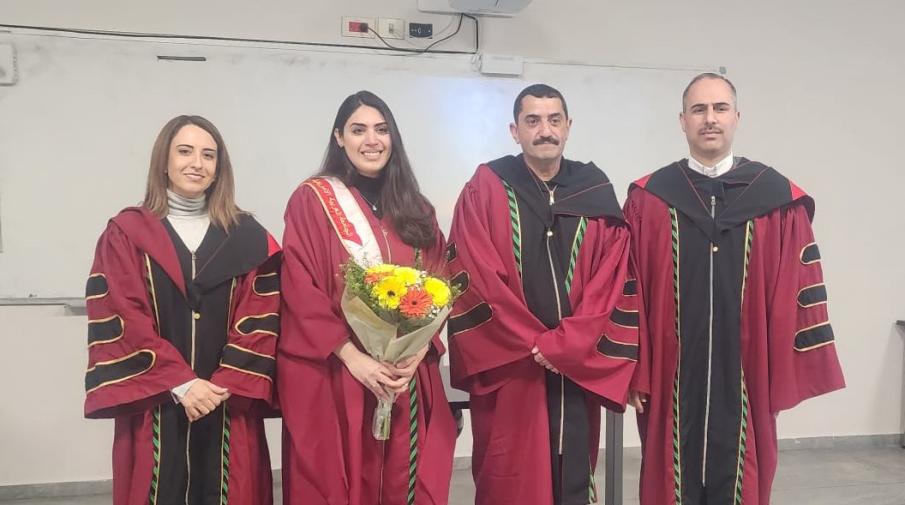Researcher Rawan Nael Obaid, a student in the Master’s program in Molecular Genetics and Genetic Toxicology, has defended her thesis titled "Functional Assessment of a Novel Mutation (SMAD4, p. Cys115Arg) in Palestinian Patient with Colorectal Cancer".
Colorectal cancer is the third most common cancer and the second most common cause of death worldwide. In the State of Palestine, it is the second most common cancer after breast cancer. Because of this widespread prevalence, detecting the causes of colon cancer has become essential. Genetic tests have become one of the most important and advanced methods for detecting cancer and to help determine the course of treatment. In this study, next-generation sequencing (NGS) technology was used to identify genetic variants that contribute to tumors in colorectal cancer. Our analysis identified the following variants: (NOTCH1, p. Asp1533Gly): p. Asp1533Gly), (EGFR, p.Leu619Pro), (MAP2K1, p.Pro265Ser), (ALK, p.Phe174Leu), (ERBB2, p.Asp1252His), (FBXW7, p.Gly477Arg), (FGFR2, p.Met538Ile) , (GNA11, p.Leu170Phe), (MET, p.Asp153Asn), (NOTCH1, p.Ala1610Thr), (PIK3CA, p.Asn107Thr), (SMAD4, (SMAD4, p.Cys115Arg)
The present study revealed that the SMAD4 gene is inactivated in somatic cells in colorectal tumors. Furthermore, loss of SMAD4 expression has been shown to be associated with both cancer progression and spread, poor reaction to chemotherapy, and decreased immune infiltration, enhancing its use as a prognostic marker for colon and rectum cancer patients. The results also showed that the mutation (SMAD4, p. Cys115Arg) is the likely cause of the development and spread of colon cancer. To investigate the function of the identified variant, Luciferase assay technology was employed to evaluate the effect of the mutation on SMAD4 gene transcription. It revealed that the mutation reduced the transcriptional activity of the SMAD4 gene by four-fold compared to the common genotype of the SMAD4 gene.
The thesis was supervised by Dr. Nouar Qutob and co-supervised by Dr. Zaidoun Salah. The committee of examiners included: Dr. Imad Maatouq and Dr. Firas Al Batta.

